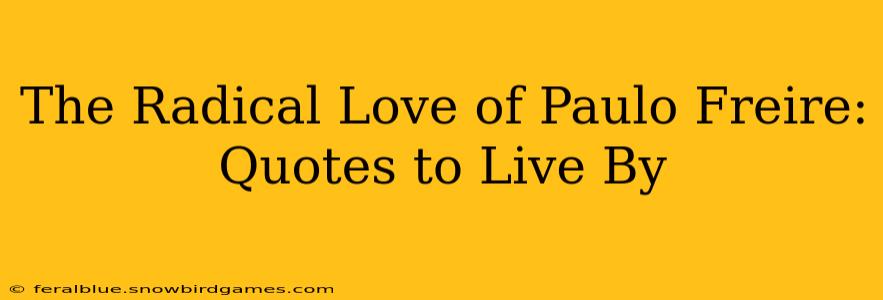Paulo Freire, a renowned Brazilian educator and philosopher, wasn't just a champion of literacy; he was a champion of humanity. His work transcended pedagogical theory, delving into the very essence of human connection and social justice. While often remembered for his groundbreaking work on critical pedagogy, Freire's writings are infused with a profound and radical love – a love demanding liberation, dialogue, and a commitment to the dignity of all people. This exploration dives into some of his most impactful quotes, unpacking their meaning and relevance in today's world.
What is "Radical Love" in the Context of Freire's Work?
Before we delve into specific quotes, it's crucial to understand what Freire meant by "radical love." It wasn't a sentimental affection; rather, it was a deeply committed praxis—a love manifested through action and a relentless pursuit of justice. Freire's radical love demanded a critical examination of oppressive systems, a commitment to dialogue, and a willingness to challenge the status quo to create a more equitable world. It was a love that demanded change, not complacency.
"Washing one's hands of the conflict between the powerful and the powerless means to side with the powerful, not to be neutral."
This quote encapsulates the core of Freire's radical love. Neutrality in the face of injustice is, according to Freire, a form of complicity. True love demands active engagement, a commitment to challenging systems that perpetuate inequality and suffering. It's a call to action, urging us to choose a side – the side of the oppressed and marginalized.
"Education either functions as an instrument to facilitate integration of the younger generation into the logic of the present system and bringing about conformity or it becomes the practice of freedom, the means by which men and women deal critically and creatively with reality and discover how to participate in the transformation of their world."
Here, Freire highlights the transformative potential of education. Education, for him, wasn't simply the transmission of knowledge; it was a process of liberation. It's a powerful tool that can either reinforce oppressive structures or empower individuals to challenge them. Radical love, in this context, is manifested through education that fosters critical thinking, creativity, and a commitment to social change.
What are the key principles of Freire's critical pedagogy?
Freire's critical pedagogy is built on several interconnected principles:
- Dialogue: Learning is a collaborative process, not a top-down transmission of information. Dialogue fosters mutual respect and understanding.
- Conscientization: This involves raising critical awareness of social injustices and empowering individuals to challenge them.
- Praxis: The integration of theory and practice; critical reflection combined with transformative action.
- Liberation: The ultimate goal of education is the liberation of individuals and societies from oppression.
"The banking concept of education…treats students as empty vessels to be filled by the teacher."
This quote critiques traditional, teacher-centered education. Freire rejected the "banking" model, where knowledge is passively received. Instead, he advocated for a dialogical approach, where students actively participate in the learning process, bringing their own experiences and perspectives to the table. This participatory approach reflects a deep respect for the learner’s inherent dignity and potential, reflecting his radical love.
"Hope is not the conviction that something will turn out well, but the certainty that something makes sense, regardless of how it turns out."
This quote speaks to the resilience of the human spirit. Even in the face of seemingly insurmountable challenges, Freire's radical love finds meaning in the struggle itself. Hope isn't about naive optimism, but about finding purpose and meaning in the fight for justice.
Conclusion: A Legacy of Love and Action
Paulo Freire's legacy extends far beyond the classroom. His work serves as a powerful reminder that true love is not passive; it demands action, critical consciousness, and a commitment to creating a more just and equitable world. His quotes continue to inspire educators, activists, and individuals striving to build a better future, fueled by a radical love that transforms lives and societies.

